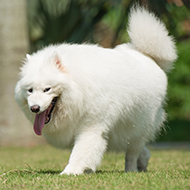Vets urge owners to rethink dog walks in hot weather

Ten times as many dogs need veterinary treatment for heat-related illness following exercise as for being overheated in cars.
Vets and animal welfare groups are calling on pet owners to rethink taking their dogs for a walk during hot weather.
The BVA, the RVC, the RSPCA, Blue Cross and Battersea are among the organisations that have teamed up to spread the message: Dogs Die in Hot Cars and Dogs Die on Hot Walks.
Their call follows research published in the journal Animals, which found that heatstroke caused by exercise was just as likely to kill as heatstroke from a hot car.
As part of the campaign, the coalition is urging pet owners to learn the early warning signs of heatstroke to avoid putting their dogs at risk, and understand what action to take in an emergency.
Dr Dan O’Neill, an associate professor in companion animal epidemiology at the RVC, commented: “Heat-related illness can lead to organ failure, brain damage and ultimately death.
“Most people know that dogs die in hot cars, but the reality is that more than 10 times as many dogs need veterinary treatment for heat-related illness following exercise as for being overheated in cars.
“It can take weeks for a dog to acclimatise to hot weather, so after a spell of cold winter, periods of hot weather can be particularly dangerous.”
Esme Wheeler, RSPCA dog welfare specialist, said that if owners are worried about their pets not getting enough exercise during hot weather, they can give them a paddling pool and produce frozen dog treats to keep them cool and entertained.
She added: “All breeds of dog are at risk, but if your dog has an underlying health condition, especially one affecting their breathing, then they could overheat more easily, as well as overweight dogs, dogs with double coats, and some larger and flat-faced breeds.
“We have long-campaigned that dogs die in hot cars, but this year we’re highlighting that dogs die on hot walks, too. The message remains very simple - never leave a dog in a hot car because ‘not long’ is too long, and when it comes to walks, ‘if in doubt, don’t go out.’”



 The WSAVA has invited veterinary professionals to a webinar on responsible antibiotic usage in dentistry.
The WSAVA has invited veterinary professionals to a webinar on responsible antibiotic usage in dentistry.